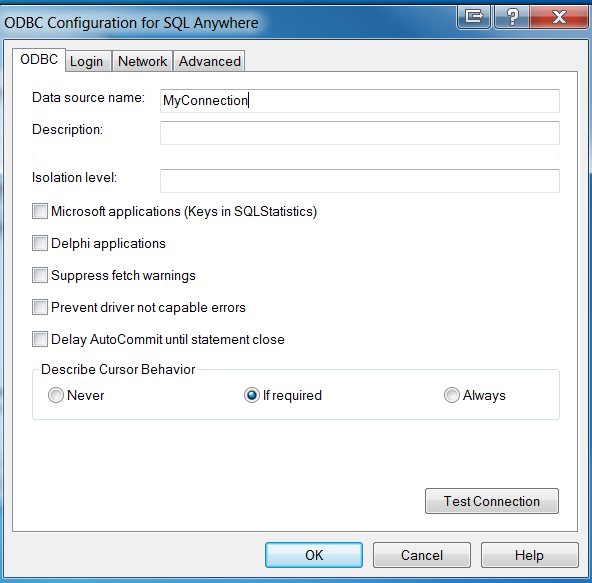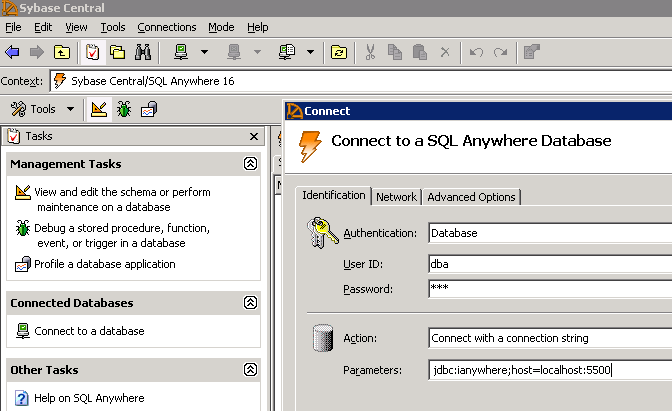

You just need to modify your php.ini file to include the line: extension=php_odbc.dll

It's an easy fix though since the extension should already exist in the \ext\ folder that came with PHP7. PHP7 has a few modules disabled by default that were previously enabled in PHP5.
#SQL ANYWHERE CLIENT VERSION PHP DRIVER#
So my intension is there is no existing driver for odbc and PHP 7 yet?īut I need something for my Windows environment.ĭoes anyone had the same issue and has already fixed it? But I can't find them in the new PHP 7.0.ini The difference from the php.ini in the 5.6 version is there is the extension: ::1:63003] PHP Fatal error: Uncaught Error: Call to undefinedĬ:\Bitnami\wampstack-7.0.0-0\apache2\htdocs\test\query.php:11\nStackĬ:\Bitnami\wampstack-7.0.0-0\apache2\htdocs\test\query.php onįirst I thought, that my php.ini has a missing extension, so I enabled "extension=php_pdo_odbc.dll" But now I'm trying to connect to a MSSQL-Database with the following simple script, that worked fine with my old installation (PHP 5.6): īut now I got an error in my logs that says:

lib64/libodbcinst.so.1 -> libdbodbcinst16_r.so.I upgraded my PHP 5.6.30 ( ) to PHP 7.0 ( )Įverything worked fine so far and it reduces the loading time from my Page from 1,2 seconds to ~300 ms, when I use a MySQL-Database. lib64/libodbcinst.so -> libdbodbcinst16_r.so lib64/libdbodbcinst16_r.so -> libdbodbcinst16_r.so.1

lib64/libdbodbcansi16_r.so -> libdbodbcansi16_r.so.1 Do I have to use one of these? Which one? And how? But I have trouble getting things up and running.ġ) Do I have to use unixODBC in addition to the PHP extension or is the PHP ODBC extension all I need?Ģ) There are some ODBC libraries in the SQL Anywhere 16 client package, see below. More information on iODBC, is available at » with the alternative unixODBC available at » This sounds as if I could connect using the PHP-ODBC-extension.
#SQL ANYWHERE CLIENT VERSION PHP DRIVERS#
However, building PHP with iODBC support enables you to use any ODBC-compliant drivers with your PHP applications. The functions that you use to speak natively to them just happen to share the same names and syntax as the ODBC functions. Note: With the exception of iODBC, there is no ODBC involved when connecting to the above databases. The following databases are supported by the Unified ODBC functions: » Adabas D, » IBM DB2, » iODBC, » Solid, and » Sybase SQL Anywhere. Instead of maintaining multiple database drivers that were all nearly identical, these drivers have been unified into a single set of ODBC functions. In addition to normal ODBC support, the Unified ODBC functions in PHP allow you to access several databases that have borrowed the semantics of the ODBC API to implement their own API. This extension is lacking for PHP 7.4.6, unfortunately. In the past I have been connecting to the same server from PHP 5.x, and this was easy because there was an PHP extension in the SQL Anywhere Client package. I am trying to connect from an OpenSuse 15.3 Linux server, more precisely, from PHP Version 7.4.6 (Apache2 module) to SQL Anywhere Server Version 16.


 0 kommentar(er)
0 kommentar(er)
